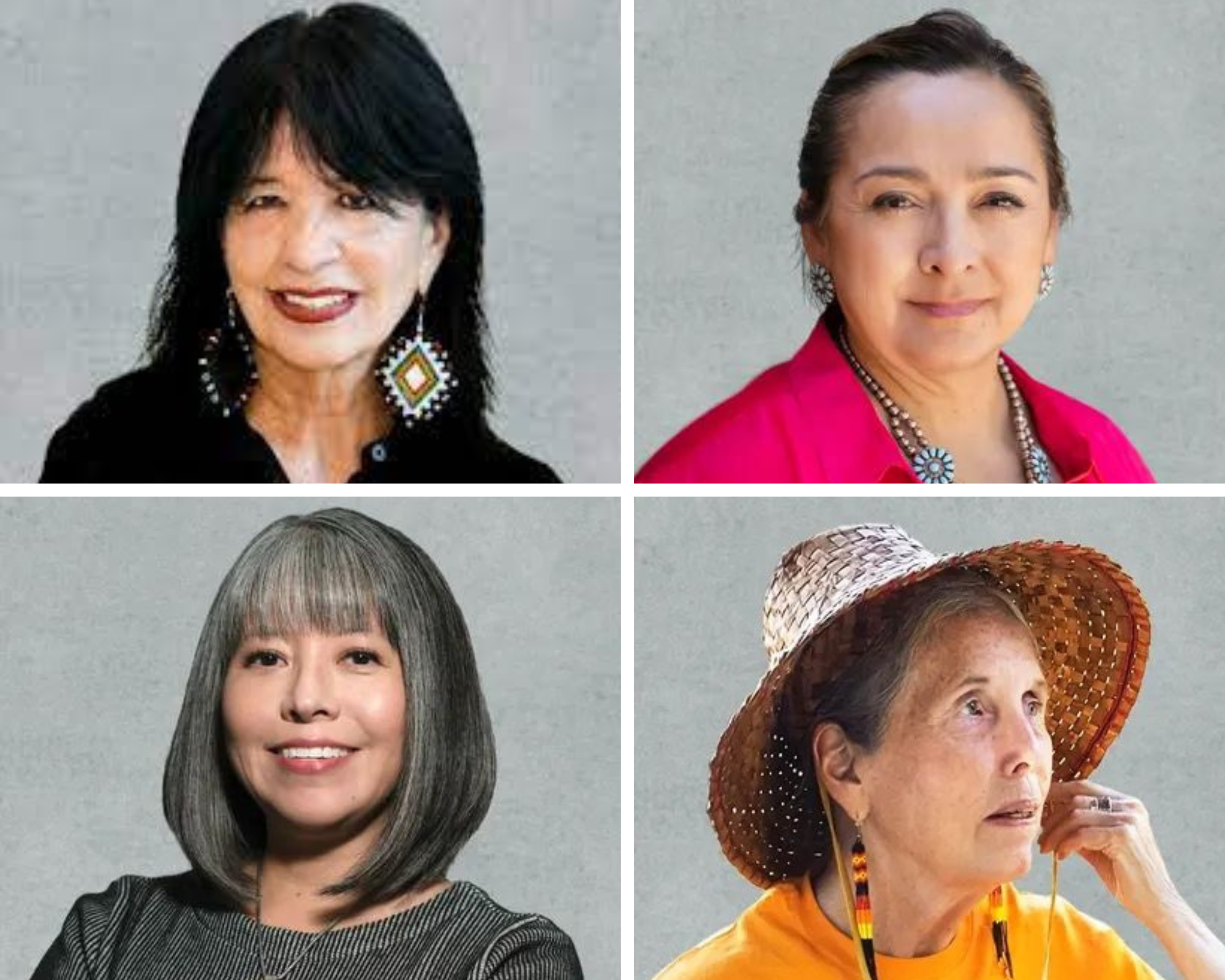
- Details
- By Elyse Wild
The third annual Forbes 50 over 50 Impact List came out last week, and four women making an impact in Indian Country made the list along with high visibility women like Jamie Lee Curtis.
The list highlights dynamic female leaders and entrepreneurs who have achieved success over the age 50, often overcoming formidable odds or barriers, providing that success has no age limit.
This year’s list, produced in partnership with Mika Brzezinski and the Know Your Value platform, divides these women into four categories: Impact, Investment, Innovation, and Lifestyle.
Meet the four women–already well known to Indian Country–who make the list:
Joy Harjo (72), Artist in Residence, Bob Dylan Center: Joy Harjo (Muscogee Creek Nation) is an internationally renowned performer and writer who became the 23rd Poet Laureate of the United States. She served for three terms from 2019 to 2022. Her project as Poet Laureate, “Living Nations, Living Words,” is a digital mapping of contemporary Native poets about the importance of place and is now in the Library of Congress’ permanent collections. She received The Leadership Award from the Academy of American Poets, a Lifetime Achievement Award from the National Book Critics Circle in 2022 and Yale’s 2023 Bollingen Prize for American Poetry. In 2022 she released a book of prose, a collection of poetry and a new children’s book. She also helped write “We Are America,” an experimental American anthem sampling sounds from across the country. Harjo has built her career on poetry but has made a living through other creative means, including writing screenplays, teaching in academic institutions, playing saxophone, performing and speaking.
Stephine Poston (55), Co-founder of Native Women Lead: Stephine Poston is one of the co-founders of Native Women Lead, an organization she helped establish to invest in and provide loans to Native women founding and running businesses. She is also the founder of Poston & Associates, a full-service communications firm specializing in serving the Native American population. Under Poston’s guidance, Native Women Lead has piloted three lending programs since 2020 to help Indigenous businesses in New Mexico, Arizona, Colorado, and Utah. She launched the Matriarch Restoration Fund in March 2022, which offers $10,000 to $50,000 loans at 3 percent interest rates to Native women artists, makers, crafters, and creatives in the Indigenous communities.
Cynthia Chavez Lamar (51), Director of the National Museum of the American Indian, Smithsonian Institution: Cynthia Chavez Lamar (San Felipe Pueblo) took office as the director of the National Museum of the American Indian (NMAI). She is the first Native American woman to lead a Smithsonian Institution museum. She oversees an institution with more than 1 million objects and photographs and over 500,000 films, digital images, and other media documenting Native Nations and tribes’ cultures and experiences. Chavez Lamar grew up in Katishtya, the Pueblo of San Felipe (her tribe’s reservation), and earned a doctorate in American studies from the University of New Mexico. Chavez Lamar’s career is coming full circle. The first job she took after earning her doctorate was an internship at NMAI, contributing research towards the museum’s expansion. Under her leadership, the NMAI dedicated the National Native American Veterans Memorial in 2022. It was a $15 million project and the first large public celebration the NMAI held since March 2020.
Ramona Bennett (84), Activist: Romona Bennett (Puyallup Tribe) is a longtime leader from the Puyallup Tribe from western Washington state and a pioneering civil rights leader who has dedicated much of her life to advocating for the rights of indigenous people in the U.S. Throughout her life, she’s fought for social and healthcare services and tribal fishing rights. Her work has been peppered with threats to her safety and she has survived multiple assassination attempts during the Fish Wars protests of the 1960s and 1970s. In 1978, Bennett’s advocacy and testimony in legislative hearings helped pass the Indian Child Welfare Act. She was Puyallup tribal chairwoman from 1971 to 1978 but was denied entry to the national tribal chairwoman’s committee for being a woman. She held her ground and insisted on being present. In 2022, she began campaigning to amend a law that she believes undermines the fishing rights of tribes in the Pacific Northeast.
Update: A previous version of this article named Fawn Sharp as a 50 over 50 Impact List and omitted Ramona Bennett.
More Stories Like This
Native News Weekly (August 25, 2024): D.C. BriefsUS Presidents in Their Own Words Concerning American Indians
Native News Weekly (January 18, 2026): D.C. Briefs
Federal Judge Orders ICE to Halt Use of Pepper Spray, Arrests of Peaceful Protesters in Twin Cities
Tunica-Biloxi Cultural Leader John D. Barbry Walks On
Help us defend tribal sovereignty.
At Native News Online, our mission is rooted in telling the stories that strengthen sovereignty and uplift Indigenous voices — not just at year’s end, but every single day.
Because of your generosity last year, we were able to keep our reporters on the ground in tribal communities, at national gatherings and in the halls of Congress — covering the issues that matter most to Indian Country: sovereignty, culture, education, health and economic opportunity.
That support sustained us through a tough year in 2025. Now, as we look to the year ahead, we need your help right now to ensure warrior journalism remains strong — reporting that defends tribal sovereignty, amplifies Native truth, and holds power accountable.
 The stakes couldn't be higher. Your support keeps Native voices heard, Native stories told and Native sovereignty defended.
The stakes couldn't be higher. Your support keeps Native voices heard, Native stories told and Native sovereignty defended.
Stand with Warrior Journalism today.
Levi Rickert (Potawatomi), Editor & Publisher


